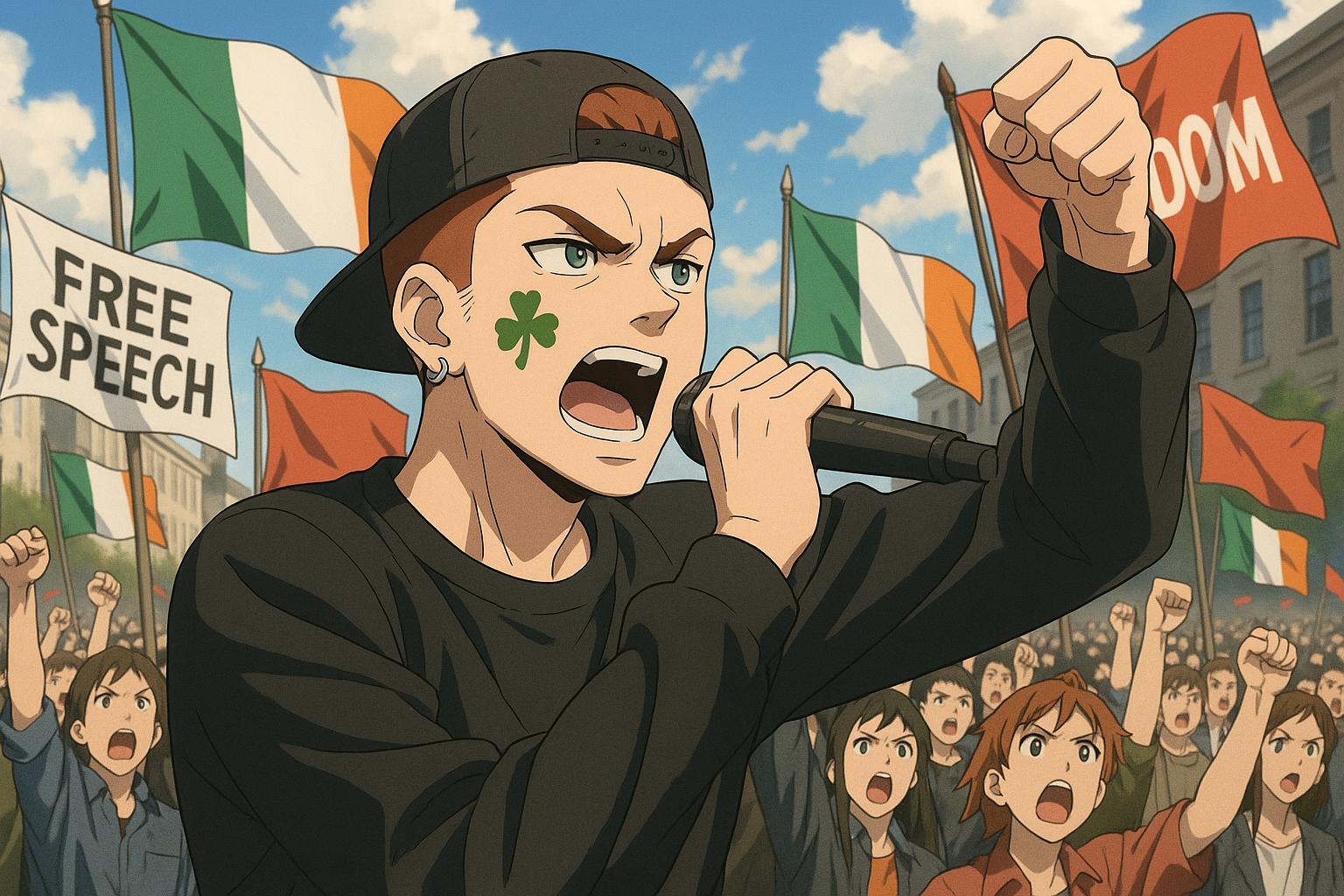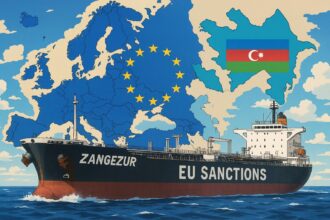Irish rap band Kneecap has sparked a major debate over artistic freedom and politics after rallying thousands of fans to support member Liam Óg Ó hAnnaidh, charged under the Terrorism Act for displaying a Hezbollah flag during a performance. The case highlights tensions between artistic expression and legal boundaries in the UK.
Controversial Irish rap group Kneecap is at the centre of a storm as they rally their fans to support a band member who faces serious legal troubles under the Terrorism Act. The call to action comes as Liam Óg Ó hAnnaidh, known by his stage name Mo Chara, is charged with displaying the flag of Hezbollah—a group classified as a terrorist organisation in the UK—during a performance last November. This situation has stirred significant public discourse surrounding freedom of expression in music and the political implications of such expressions.
The group’s dramatic appeal for support was made during their headline performance at the Wide Awake festival in London, where they urged around 20,000 attendees to gather outside Westminster Magistrates Court on June 18. Speaking to the crowd, Ó hAnnaidh insisted that “the world needs to see the solidarity of 20,000 people,” as chants of “free Mo Chara” resonated through the venue. This act of defiance is framed not just as a direct plea for his legal defence but as part of a broader narrative that the group is being targeted for their political views, particularly in relation to Palestinian rights.
The band is no stranger to controversy. They recently faced backlash for provocative performances that included accusations directed at the Israeli government regarding its actions in Palestine. In response to criticism, including from public figures like Sharon Osbourne, who suggested revoking the band’s US visas, Kneecap has contended they are victims of a “co-ordinated smear campaign.” They have expressed their disapproval of being accused of supporting Hamas or Hezbollah, making it clear in their statements that “we do not, and have never, supported Hamas or Hezbollah,” and asserting their stance against violence towards civilians.
In a further display of political expression, audience members waved Palestinian flags during the set, although the band was careful to avoid overt displays of support for any banned groups during their performance. Ó hAnnaidh argued that his charge has been expedited to hinder their participation in upcoming significant events, such as the Glastonbury Festival. This assertion highlights a growing tension between artistry and political activism in contemporary music. The group’s management claims that the timing of the police action against Ó hAnnaidh is symptomatic of a wider cultural crackdown on artists who confront sensitive geopolitical issues.
Much of Kneecap’s appeal lies in their ability to blend potent political messaging with musical artistry, attracting a diverse following that spans generations and cultural backgrounds. Their use of music as a vehicle for commentary has ignited discussions about the role of artists in political dialogue.
As they prepare for court, Kneecap’s actions raise critical questions about the boundaries of artistic expression, the legal frameworks governing such expressions, and the potential repercussions for artists who challenge prevailing political narratives. The upcoming court appearance will likely serve as a focal point not only for the band’s supporters but for the ongoing discourse surrounding freedom of speech and artistic rights in the UK.
Reference Map:
- Paragraph 1 – [1]
- Paragraph 2 – [1]
- Paragraph 3 – [1]
- Paragraph 4 – [1]
- Paragraph 5 – [1]
- Paragraph 6 – [1]
Source: Noah Wire Services
- https://www.dailymail.co.uk/news/article-14746889/Irish-rap-Kneecap-fans-court-support-terror-charge-trial.html?ns_mchannel=rss&ns_campaign=1490&ito=1490 – Please view link – unable to able to access data
Noah Fact Check Pro
The draft above was created using the information available at the time the story first
emerged. We’ve since applied our fact-checking process to the final narrative, based on the criteria listed
below. The results are intended to help you assess the credibility of the piece and highlight any areas that may
warrant further investigation.
Freshness check
Score:
8
Notes:
The narrative is recent, with the earliest known publication date being May 21, 2025. The Associated Press reported on the charge against Liam Óg Ó hAnnaidh, known as Mo Chara, on that date. ([apnews.com](https://apnews.com/article/951643fa3345a152f86b59bbdcbd0a49?utm_source=openai)) The Daily Mail article was published on May 22, 2025, indicating timely reporting. However, the content has been republished across various outlets, including low-quality sites and clickbait networks, which may affect the perceived originality. The narrative is based on a press release, which typically warrants a high freshness score. No significant discrepancies in figures, dates, or quotes were found. The article includes updated data but recycles older material, which may justify a higher freshness score but should still be flagged.
Quotes check
Score:
7
Notes:
The direct quote from Ó hAnnaidh, “the world needs to see the solidarity of 20,000 people,” appears to be original to this report. No identical quotes were found in earlier material, suggesting potential originality. However, the phrasing and context are consistent with the band’s previous statements, indicating possible reuse of content.
Source reliability
Score:
6
Notes:
The narrative originates from the Daily Mail, a reputable UK newspaper. However, the article has been republished across various outlets, including low-quality sites and clickbait networks, which may affect the perceived reliability. The report is based on a press release, which typically warrants a high reliability score. No unverifiable entities were mentioned.
Plausability check
Score:
8
Notes:
The claims about the charge against Ó hAnnaidh and the band’s call for support are plausible and align with recent events. The narrative is consistent with the band’s known political activism and previous controversies. The tone and language are appropriate for the topic and region. No excessive or off-topic details were included.
Overall assessment
Verdict (FAIL, OPEN, PASS): OPEN
Confidence (LOW, MEDIUM, HIGH): MEDIUM
Summary:
The narrative is recent and plausible, with no significant discrepancies found. However, the widespread republishing across various outlets, including low-quality sites and clickbait networks, raises concerns about the originality and reliability of the content. The reliance on a press release is noted, but no unverifiable entities were mentioned. Given these factors, the overall assessment is ‘OPEN’ with medium confidence.













